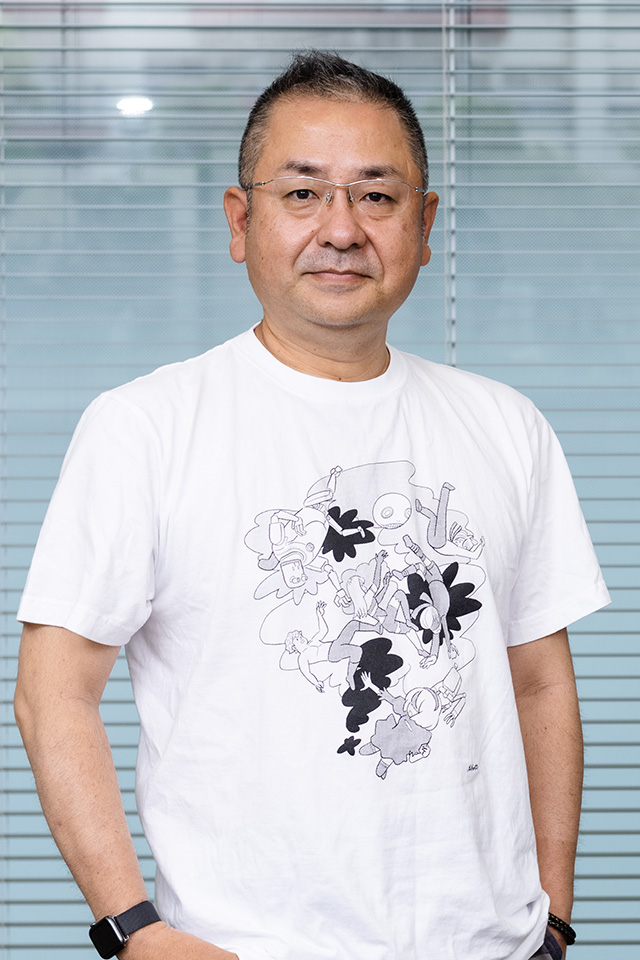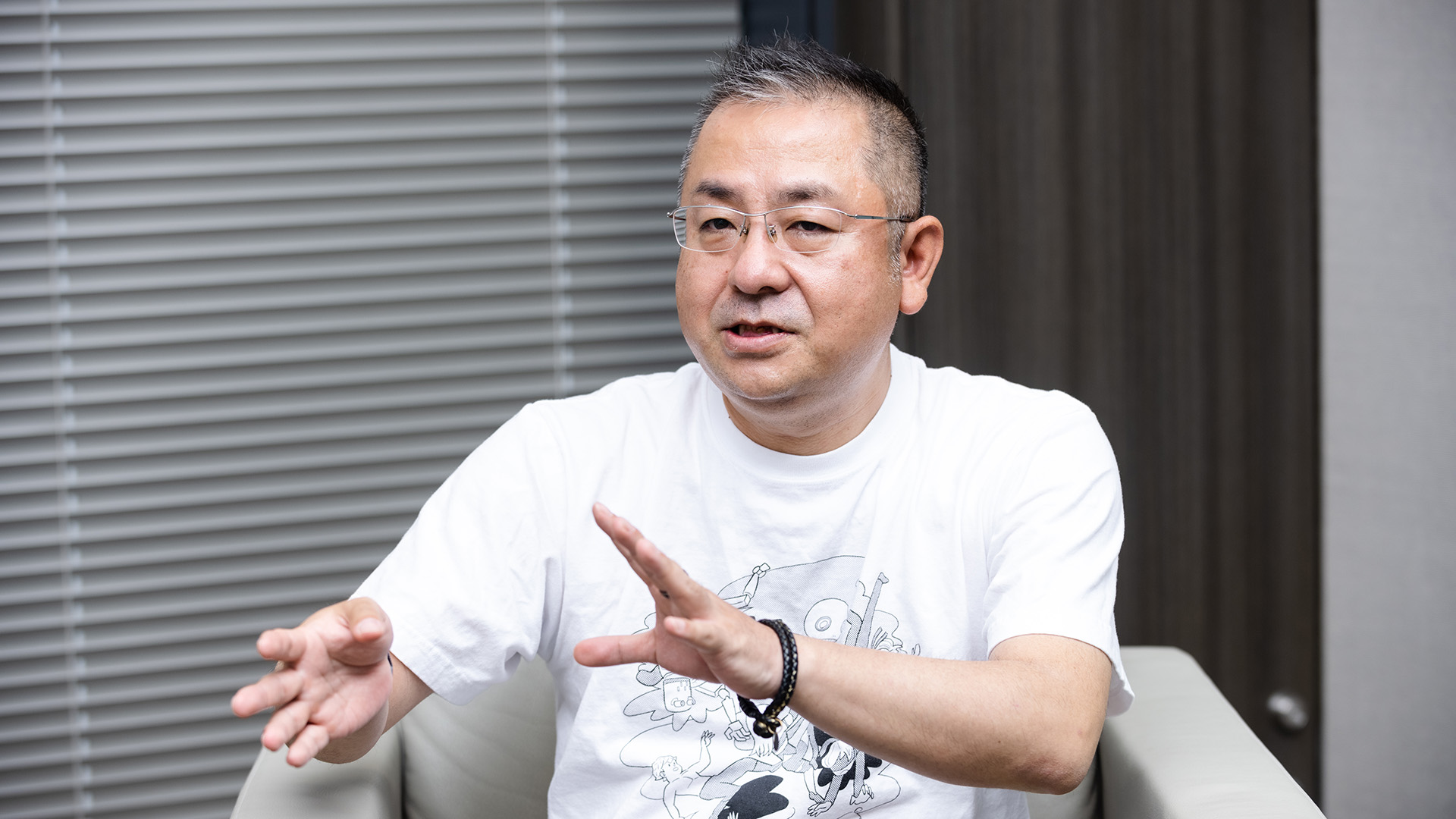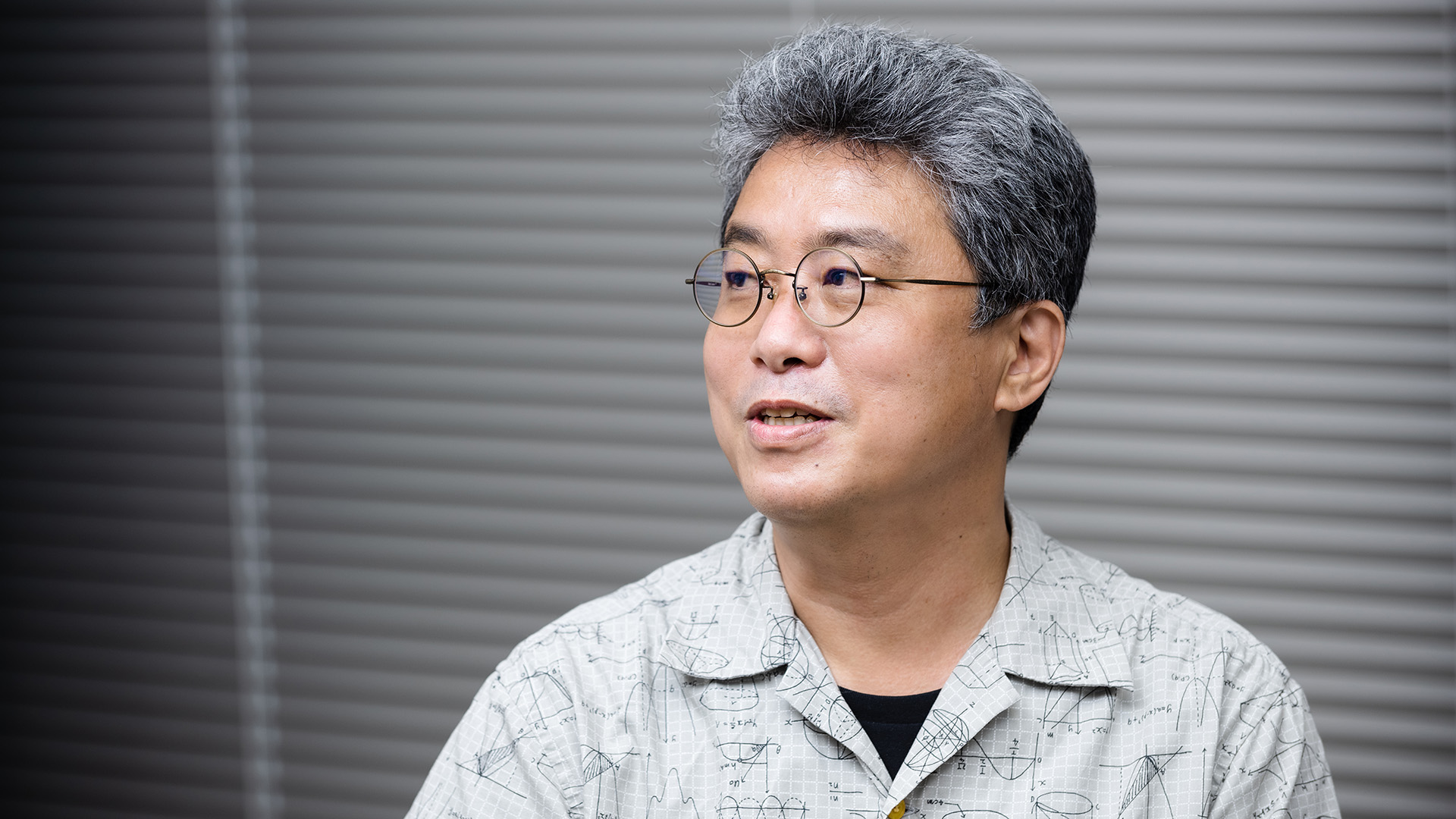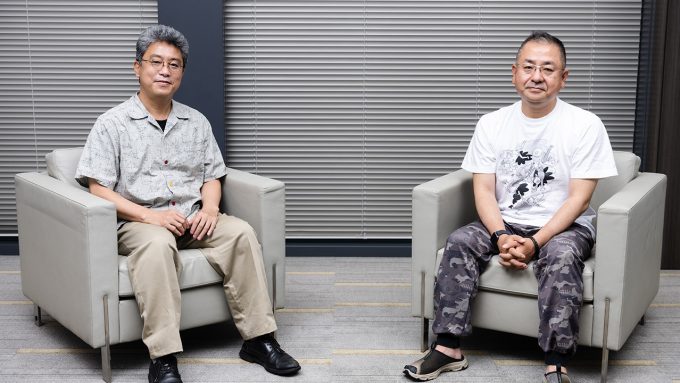For our second guest, we invited Yosuke Saito, the original producer of DRAGON QUEST X Online (DQX) and a fellow adventurer in FINAL FANTASY XI (FFXI). In this third part, he talks about the early beginnings of the DQX Online project, among other topics.

Square Enix Executive Director involved in various projects, including the NieR series and the virtual idol group Gems Company.
Producer of DRAGON QUEST X Online from the beginning of development until 2018.
He is currently the Producer of BABYLON’S FALL developed by Platinum Games.
DRAGON QUEST X Online: A place for DRAGON QUEST fans to enjoy themselves whenever they want
DRAGON QUEST X Online (DQX Online) is the first online title in the DRAGON QUEST series. Did your game experience with FFXI play a part in your decision to go online?
- Saito
I didn’t have too much to say about the content of the game. However, a major prerequisite I had for the team was to make the game enjoyable even when playing solo.
DQX Online has a system where you can recruit support characters at the bar to accompany you on adventures in a similar manner to previous entries in the series, allowing you to go on adventures as a solo player.
As it was the first online game in the DRAGON QUEST series and likely many players’ first experience with online games, I also advised the team to make DQX Online more casual compared to existing online titles. Aside from that, I told them that players shouldn’t be separated from their friends on different servers. I think that’s about all I personally brought up.
The director at the time, Mr. Jin Fujisawa, took it from there and molded the game in various ways to be friendlier for DRAGON QUEST fans, such as removing the log display typically seen in MMORPGs, and implementing a command-based system similar to previous DRAGON QUEST titles. - Matsui
DQX Online certainly seems to have attracted a different audience compared to other previous online titles such as FFXI and FFXIV.
- Saito
Mainline titles in the DRAGON QUEST series are released at a slower pace, so there are often stories of players that got into DRAGON QUEST in elementary school who, by the time the next mainline entry was released, were too busy with high school entrance exams. I was discontent with that and wanted DQX Online to be a place for DRAGON QUEST fans to enjoy themselves whenever they want. Perhaps housewives could meet up in-game to discuss their plans for dinner, and people could invite each other to Coin Boss fights after a light-hearted conversation.
Because DQX Online is like an aspect of community management for the DRAGON QUEST series as a whole, we refrained from making the game too hardcore. After all, there were already many hardcore MMORPGs out there, and you may as well play FFXI if that’s what you’re looking for.
By then FFXI had reached maturity with a wide selection of casual and high-end content. There was no way an ensuing title could outdo that, so I may have consciously tried to differentiate the game from that. Sounds like you began by considering what an online version of DRAGON QUEST should be, rather than replicating your experience of playing FFXI.
- Saito
Yes. Considering all the things FFXI had accomplished up until then, recreating something similar would be very difficult.
So DQX Online was designed to be easier to get into for those who would be playing online games for the first time. Were there any similar concepts to ease FFXI for those who might be unfamiliar with online games?
- Matsui
I don’t think we looked into it too deeply. However, most of the MMORPGs I had played for research took a stance of having players resolve their own disputes over things like claiming monsters and PKing*. I felt that wouldn’t be accepted by FINAL FANTASY fans and tried to prevent those situations as much as possible with in-game systems.
* Abbreviation of “player killing,” or the act of attacking another player in non-combative games, such as MMORPGs. Both the FINAL FANTASY and DRAGON QUEST series have elements that are expected to be in their games. Were there any situations where you had to subvert those expectations to make an online game?
- Matsui
The game world is shared between numerous players, and I recall the Event team struggling with the fact that characters that disappeared over the course of the story couldn’t be displayed on the map.
In my case, I was unsure when to implement ultimate weapons like Excalibur, which typically appeared towards the end of a game. I consulted Mr. Tanaka (Hiromichi Tanaka, original producer of FFXI), and it was around when we were implementing Dynamis that he answered, “Shouldn’t it be okay to add them now?” That was one problem I encountered due to the never-ending nature of the game. How about for DQX Online?
- Saito
In a similar vein to Mr. Matsui’s story, MMORPGs typically have to show the same world for both veteran players and those who just started the game. When we were coming up with the story, we really struggled being unable to destroy or change anything in the world.
So I told everyone in the beginning, “We can’t destroy anything in DQX Online, so let’s completely destroy everything in the offline part at the start of the game, it's our only chance!”

That explains why such a tragedy befell the starting village...
- Saito
When I was talking about DRAGON QUEST VIII with Mr. Horii (Yuji Horii, creator of the DRAGON QUEST series), I’d told him, “The events in the first village didn’t seem all that dire since only one house caught fire.”
The character models faithfully recreated Akira Toriyama’s art style beginning with DQVIII, but I felt that it took away some of the urgency in the storytelling. So in DQX Online, I wanted to go for complete destruction. Within the DQ development team, rather than Mr. Horii, it was the other staff members who had preconceived notions of what DRAGON QUEST should be, and it felt like everyone was careful not to tread on Mr. Horii’s ideas.
But Mr. Horii himself didn’t really have that mentality, and I got the impression that he lived by a creed like “Anything goes if it's interesting, fun, and can surprise the players.” R-rated themes are obviously out of the question, but aside from those kinds of outliers, there weren’t many things I couldn’t do because it’d be uncharacteristic of the series. In that sense, I felt very free when working on the game. Was there any supervision from Mr. Horii about the contents of the game?
- Saito
It was way more than just supervision, we held weekly meetings late into the night to discuss the scenario as we ate bento lunches. (laughs) The game systems were also discussed and chosen in a similar fashion.
Did Mr. Horii take any different approaches for this game, since it was online?
- Saito
Mr. Horii talked about how we should have all sorts of characters since there were going to be many players. Since Akira Toriyama was illustrating the world, I’d thought DQX Online’s world would be like Penguin Village in his series “Dr. Slump,” where characters were anywhere between 2 heads tall and 6 heads tall and ranged from youths to elderly characters. However, Mr. Horii and Mr. Fujisawa mentioned, “Couldn't we add more than just humans?” and added all sorts of different races.
In that sense, I think they were able to create something several times better than what I had in mind. - Matsui
I see, so those races came from Mr. Horii’s idea.
- Saito
I think they were the result of discussions between Mr. Horii and Mr. Fujisawa.
By the way, how were the playable races for FFXI selected?
- Matsui
We started with several different races that we felt should be in the game, with variations like macho characters and witches. There were many more than the current five races, but I had to ask them to narrow it down as it would’ve been impossible to accommodate equipment designs for each one.
Not only that, but each race in FFXI would require unique animations for weapon skills and casting spells too. But during the process of narrowing it down, Mr. Sakaguchi (Hironobu Sakaguchi, one of the founders of the FF series) and Mr. Kato (Masato Kato, plot writer until Rise of the Zilart) insisted on keeping the grandpa character, so it made it in as a face type for Elvaan. So Elvaan’s Face Type 8 is there because of Mr. Sakaguchi and Mr. Kato's wishes. (laughs)
- Matsui
More races and gender options meant more production workload and increased memory, so it was something we agonized over quite a bit.
As for Tarutaru, we really wanted to add options for both male and female characters, so we pulled it off by giving them the same animations and equipment to reduce development cost. So the current five races are the bare minimum from which we felt players would be able to pick out a character that suits their tastes. I would've liked to have added more if it were possible. Returning to the topic of DQX Online, was the project already in motion before Square and Enix merged?
- Saito
The project was already in motion before the merge.
When the companies merged, I was told about someone who was fit for the DQX Online development team, which was my first encounter with Aoyama (Koji Aoyama; Technical Director turned Producer of DQX Online). My first impression of him was, “I don’t think I can be friends with this guy.” (laughs wryly)
His demeanor has softened nowadays, but at the time he was like the embodiment of a “scary programmer” and very stubborn-minded. Over a long period of time, I gradually got him to loosen up, though it could be that he simply grew milder with age. (laughs) - Matsui
In a way though, you can rest assured when you have programmers like that.
- Saito
I personally look for two types of programmers in a team.
One is the stubborn-minded programmer who has a firm definition of what can be done or not. The other is the type of programmer that says something can be done even if it isn’t usually considered possible, and tackles the problem in unconventional ways, leaving you with hope that it might actually be possible. When it comes to work, my wish is for those two types of programmers to balance each other out. - Matsui
I get the impression that you're good at finding those kinds of people, Mr. Saito.
- Saito
I mean, that’s about all I do for work, after all. (laughs)
- Matsui
But it’s a very crucial job. Getting stubborn-minded people to loosen up isn’t as simple as it sounds, either.
What was your perspective on DQX Online, Mr. Matsui?
- Matsui
Before DQX Online was released, Mr. Kazuhiko Aoki, whom I'd worked with on FFIV and Chrono Trigger, sent me an email asking how Nyzul Isle was implemented. I wasn’t directly involved with the Nyzul Isle project, so I asked the person in charge and relayed their response to Mr. Aoki.
After that, I said, “Why don’t we all get together and talk more openly as developers?” and held a few gatherings together with the DQX Online development team, so our teams were familiar with each other before their game launched. Were these gatherings for your team to provide advice or exchange information with them regarding online game development?
- Matsui
No, I think the DQX Online project had already proceeded quite a bit by then. While it wasn’t a game I worked on, we had these interactions, so I was glad when DQX Online launched. Also, DQX Online's battles have a feature where you can push other entities around, and even push monsters and inhibit their movements. When I first heard about it, I considered it unthinkable and could hardly believe it, but sure enough, they accomplished it in their game.
- Saito
That came from Mr. Fujisawa's ideas. As someone who was new to online games, he thought it was odd when characters ignored each other’s collision and passed through each other. So we discussed with Aoyama about making the characters’ collisions interact with each other, who said it seemed extremely difficult, but we pushed through and told him we wanted to try it anyway.
- Matsui
Personally, I thought there was no way it could be possible. In fact, I thought it was impossible right up until I saw it myself when DQX Online launched. If I was part of the DQX Online team, I probably would've taken Mr. Aoyama's side. (laughs)
* Kids’ Time refers to designated hours where players can play the game without a paid subscription.
I also thought Kids’ Time* was really neat. There are people who say they wouldn’t play FFXI because it’s an online game, and I understand the uneasiness they might feel about the online aspect of the game. DQX Online allows players to casually try out the game during the free-to-play Kids’ Time, and I was impressed by how it welcomes the younger audience into the world of online games. - Saito
Even then, that was sort of a last resort for us. I remember we considered all sorts of ideas when implementing Kids’ Time.
- Matsui
Aside from that, when I was moved to the FFXIV team, I approached Mr. Saito to ask about how he kept the DQX Online development team together. That was when he showed me this infographic called the “motivation map,” which showed what players would be able to do and how their world would expand as they progressed through the game.
I found that profound and it made me aware of just how important it was for teams to have a unified vision of the completed game.

- Saito
The DQX Online team had all sorts of things to ensure everyone was on the same track, like a monthly column aimed at the whole team, department newsletters, and all hands meetings.
In the midst of that, the director still felt that we needed to improve communication within the team, which was when I had the Planner team create the motivation map. But it’s actually not all that complicated.
We list up the things that are currently in development under the categories “Battle,” “Scenario,” “Other,” etc., which makes it easy for us to spot the areas where we’re falling short or put in too much emphasis. It makes it easier to organize and plan for the future, so we shared it among the team. As game development continues to be sectioned off into specialized teams, sharing the overall vision becomes more important. Was the monthly column something like a Letter from the Producer aimed at the team?
- Saito
We wrote about some irrelevant topics in the column too.
- Matsui
Was that something you had before launch?
- Saito
Yes. It was something we did during the development process.
First, we had the development team submit a weekly report. They were essentially just comments for themselves about what they did that week or would be working on the following week, but I told them to write it for themselves anyway. If there was anything on their mind, they could include that in the beginning of the report, which I would look through and provided a response for those where it seemed necessary.
Looking through all of those weekly reports and responding to any that required replies was my job every Monday morning. The column was something I’d write every month after taking all of that into consideration. Did you have anything like that within the FFXI team?
- Matsui
I mentioned this in our conversation with Mr. Tanaka, but the FFXI team was a combination of four or five different teams that had been working separately until then. Each of them had a different workplace culture and it was difficult to have them all follow the same creative process.
We decided a few rules for areas where we had overlap, while the rest was handled individually by their respective teams, so in a way, we valued working separately. Oh, but it’s not as if we didn’t get along! (laughs) Sounds like it was simply a difference in workflow for each team.
- Matsui
In the current FFXI team, I’ve asked everyone to write a daily report about something unrelated to FFXI.
They tell me about their cat, or how it started raining when they went to go pick up their children, and I believe that sort of communication is also vital during a time like this COVID-19 pandemic situation where we can’t meet face-to-face. - Saito
We wouldn’t need a daily or weekly report if we could all meet face-to-face every day. But when a project involves a lot of people, it’s difficult to keep things going without some sort of communication.
- Matsui
The weekly report is something the FFXIV team does as well. The FFXI team’s daily report is actually something we copied from the FFXIV team, but if we go further back, it actually started with Mr. Saito.
After all, FFXIV’s Producer and Director Mr. Naoki Yoshida was from the DQX Online team.
- Saito
You could call it the “Saito method.” (laughs)
For those of you who think it’s a hassle, I do apologize. But I think it’s a valuable practice. - Matsui
As game planners, we’re always writing text anyway, so I don’t think it’s that much of a hassle for us to write a daily or weekly report.
By the way, have you played DQX Online, Mr. Matsui?
- Matsui
I thought it’d be good to raise all the classes and learn their passive skills, and your equipment gets refreshed every 7 levels, so I switched classes every 7 levels and raised all of them to about level 35.
- Saito
The passive skills provide advantageous effects so players would try all sorts of classes, but they ended up becoming a sort of tedious prerequisite in the game.
- Matsui
On another note, I really liked how you can register your character as a support partner for others to call upon and received EXP and gold when they were used, to the point where I thought to myself, “Why didn’t we think of this for FFXI?”
Were support partners added so solo players could enjoy an online game experience even when playing alone? - Saito
What I had in mind was actually MaildeQuest.
* While they vary with each game, rested bonuses provide some sort of bonus that accumulates when players aren’t actively playing the game.
While players didn’t interact with each other in real time, we were able to bridge a connection between them. We felt that even if DQX Online was an online game, not everything had to be done in real time, so we added the support partner system for players to interact with each other.
As a feature, however, it’s really just a rested bonus*.




